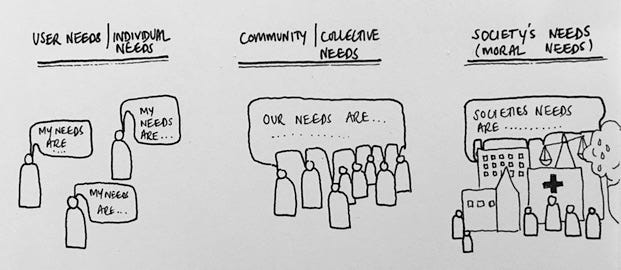Putting users first is not the answer to everything
User-centred, user need, user story, person-centred — hmm, I’m trying to think of some other variations, I’m sure there’s more!
In the mid 2000’s organisations like thinkpublic were using co-design and experience-based design as approaches to designing more people-centred public services. IDEO had been developing human-centred design as a practice. At some point in this next decade (and in my tiny corner of the world) the idea of “start with user needs” became the most used phrase in every single talk ever given about design and digital.*
This has been sitting uncomfortably with me for a while now. In part that’s because when anything becomes a bit of a dogma I question it, but it’s also because I couldn’t quite marry the mantra to my own personal experiences.
*I’m exaggerating, but only slightly.
A relationship has needs
When my Dad was still alive, and through the last 10–15 years of his life, I saw how he was offered care, based on his different conditions — he had his Parkinson’s needs, his visual impairment needs, his restricted mobility needs. My Step-mum also had her needs considered as his full-time carer — she had a support group she could register for and some coping with stress training etc.
As my Dad got more and more unwell, and his system of care needed to expand (to family friends, to my Sister and I, to other health and care professionals, to their neighbours) we were also asked more often about “what does your Dad need?”
“We need to make sure as the patient he is at the centre of all these decisions.”

Actually, the most important thing for my Dad was that the system of care that had grown around him continued. If anyone in that system had simply just their own needs considered (or not) then the whole fragile system of messy, emotional, time-pressured , under-resourced, human relationships could’ve collapsed. That would have been worse for my Dad than anything else, and yet it was never viewed as the thing that was important. It happened at a smaller level too, between my Dad and Step-mum, whereby whilst their individuals needs were met as best as possible, the needs of their relationship were never addressed. Separating out individual needs can create tensions and divisions rather than unify people to come together to care for someone.
A “Job To Be Done” is not the same as a good outcome.
I’ve been thinking about what else is at risk when we focus so much on how someone is using a service as a measure of whether it’s meeting not only their needs but also societies. For example, if we are designing the new digital justice system using success measures based on how efficiently the user can complete the thing they are trying to do rather than on whether they actually receive justice, what’s at risk there? And if we prioritise that over time, are we in some way eroding the collective awareness of what “good” justice as an outcome looks like?
Moral needs not just user needs
At Doteveryone when I introduced the digital society strand of work, I was already thinking about “moral needs” not just user needs. As we’ve been developing our work in this area and through further conversations, this feels only more relevant. When thinking about how the the internet is changing our society, understanding that and then directing the impact of that, we need to think far beyond what our needs as individuals are.

Designing and iterating services based on current user needs and behaviours means that they are never being designed for who isn’t there. Whose voice isn’t in the data? And how will the new institutions that are needed be created unless we focus more on collective agency and collective needs?
Thank you to Imogen Parker for the digital justice example in a conversation we were having yesterday.